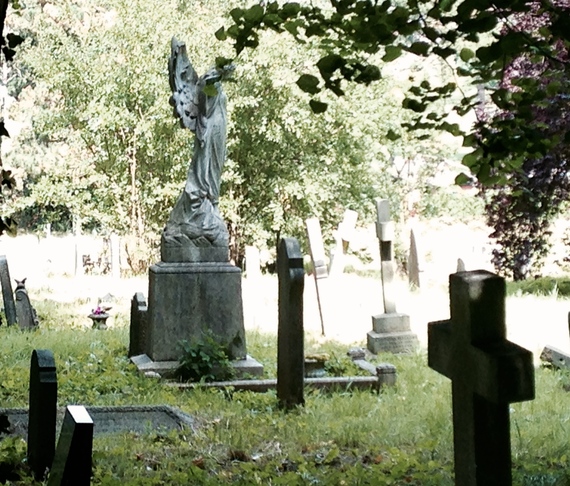Reactions varied widely to the recent news that Alex Malarkey, the young co-author of the bestselling book The Boy Who Came Back from Heaven, had in fact been trying to tell people for a long time that the best selling book about him was a fraud.
"I did not die," he said. "I did not go to Heaven."
"I knew it was all malarkey," someone said on one of my social media feeds, one reaction to the breaking news. But whether or not you believed Alex's story (or, perhaps, more properly, as it seems to be, his father's story), the stories we tell about the afterlife should not be dismissed as mere fantasy. They are central to how we make sense of some of our biggest questions about God, the Universe, and Everything.
To judge from the omnipresence of stories about Heaven and Hell, angels and demons, and ghosts, vampires, and zombies, it's an innately human desire to tell stories about what happens to us after we die, whether that story comes from an "eyewitness" account like that of young Alex, a sermon or teaching from a faith tradition, or a version of the afterlife artfully presented in a movie, novel, comic, or game.
We have been turning to stories about the afterlife as far back as we have stories. Over the years, for example, spiritual tourists have written about how they have slipped free from the bonds of this life and experienced something of the world to come in death or in a vision. From John's Revelation (1st century CE) through Mohammed's night trip to Heaven (the Mi'raj, around 621) to the 7th Century Irish monk Fursa's trip to some sort of fiery protopurgatory, and all the way up to recent best-selling works about heavenly visits, we look to those who purport to have seen into the undiscovered country for some guidance.
Likewise, works we consider to be pure imagination (and yes, I know that some people consider books such as Heaven Is for Real to be, yes, malarkey) are also exploring the afterlife on our behalf. It's in Hamlet, for example, that we find a prince who in his most famous soliloquy speaks about that undiscovered country from which no traveler returns--although he also encounters the Ghost, who speaks of being forced to walk the night while he spends his days in purging fire.
In the film Field of Dreams, often taught in classes on religion and film, Ray Kinsella (Kevin Costner) walks across the baseball field he's carved out of an Iowa corn farm with his dead father, who asks him "Is this Heaven?"
Ray asks, in return, "Is there a Heaven?"
These are the kind of questions we all ask about the afterlife, and they haunt us because, unlike other knowledge we seek, they cannot be answered from our store of experience. As Hamlet points out, no one alive can know the answer to these questions. What happens to us when we die? Is there another form of existence? Will we find consequences or rewards in that next life--if there is one--for what we did in this life? If there are consequences, will we go directly to our final state of being, or will we be forced (or allowed) to pursue some intermediary step first? Is there a God? A Devil? Is anyone up there (or down there!) looking after, or over, us?
These questions express many of our deepest concerns about existence. We wonder if there is a guiding intelligence behind the universe. If the answer is yes, does that intelligence value us? And all of these questions are taking up this question: Is the future to be longed for or feared?
Religion offers some answers to these questions. Many people of faith believe that after this life our souls, perhaps in resurrected bodies, will continue to exist. The concept of an afterlife is a part of most religious traditions, whether that next life is thought of as a place of reward, punishment, or transition, and almost all of us are familiar with some of the religious and cultural constructions of what might come next.
What awaits us, religion teaches, may be Heaven, Hell, or Purgatory--realms of the blessed, of the damned, and of the not-yet-worthy. These have become our dominant understandings of the afterlife in the West, and they can have some effect on our behavior in this life and our efforts to be faithful to our beliefs, or, at the very least, to be good human beings.
But almost about all of us--people of faith, and people with little or no faith--still have an interest in what comes next. As Miles, the narrator of John Green's young adult novel Looking for Alaska, notes in writing his final exam on the afterlife for his World Religions class, "People, I thought, wanted security. They couldn't bear the idea of death being a big black nothing, couldn't bear the thought of their loved ones not existing, and couldn't even imagine themselves not existing. I finally decided that people believed in an afterlife because they couldn't bear not to." (100)
We are believers in or consumers of these stories about the afterlife because we can't bear not to be. They can provide us with a sense of security that pain will someday end, or that there will be justice for the evil done in this life, or that the good will receive some reward. They can reassure us when this life has us on the ropes that this is not the end of things. But, as we said, all of our stories are of use to us as we try to wrestle with the big questions. Even if the afterlife story we have accepted is that there is no afterlife, it still offers us some kind of security as we navigate this life.
